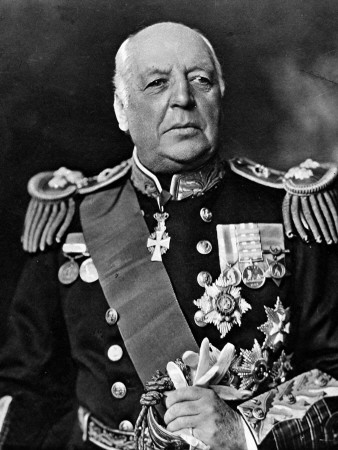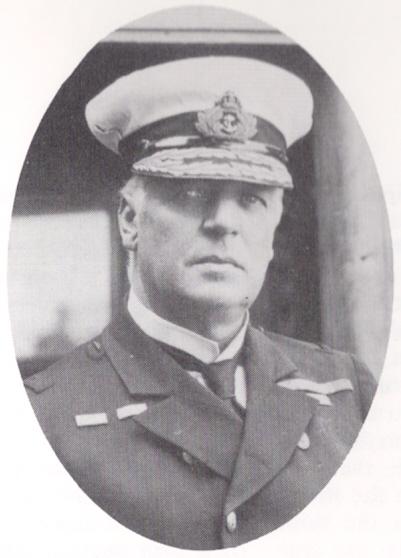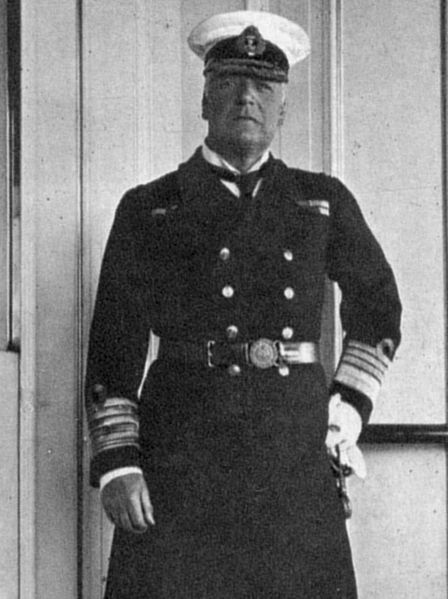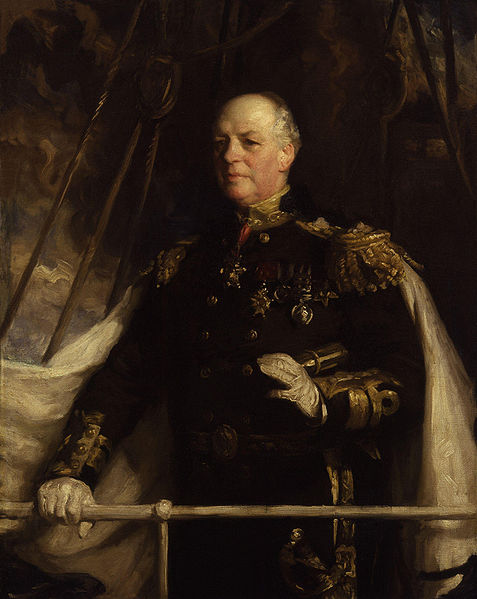<Back to Index>
- Inventor Samuel Plimsoll, 1824
- Playwright Eugen Bertholt Friedrich Brecht, 1898
- Admiral Charles William de la Poer Beresford, 1846
PAGE SPONSOR



Charles William de la Poer Beresford, 1st Baron Beresford GCBGCVO (10 February 1846 – 6 September 1919), styled Lord Charles Beresford between 1859 and 1916, was a British Admiral and Member of Parliament.
Beresford was the second son of John Beresford, 4th Marquess of Waterford,
thus despite his honorary title as second son was still eligible to
enter the House of Commons. He combined the two careers of the navy and
a member of parliament, making a reputation as a hero in battle and
champion of the navy in the House of Commons. He was a well known and
popular figure who courted publicity, widely known to the British
public as "Charlie B". He was considered by many to be a
personification of John Bull, indeed was normally accompanied by his trademark, a bulldog. His later career was marked by a longstanding dispute with Admiral of the Fleet Sir John Fisher,
over reforms championed by Fisher introducing new technology and
sweeping away traditional practices. Fisher, slightly senior to
Beresford and more successful, became a barrier to Beresford's rise to
the highest office in the navy. Beresford rose to occupy the most
senior sea commands, the Mediterranean and Channel fleets, but failed
in his ambition to become First Sea Lord. Charles was captivated by the
sight of the Channel Fleet at age twelve. Beresford
was the second of five brothers. His older brother John joined the life
guards, succeeding to the family estate and titles in 1866 on the death
of their father. William joined the 9th lancers, won a V.C. in the Zulu
wars and became military secretary to several viceroys of India. Marcus
joined the 7th Hussars, became an equerry to King George and in charge
of the King's rece horses. The youngest brother, Delaval, became a
rancher in Canada. His
family traced their ancestry to Englishmen who had invaded Ireland with
James I and stayed to rule. Their estate covered 100,000 acres
(400 km2) at Curraghmore near Waterford in South East Ireland, had stables for 100 horses and employed 600 people. The
family enjoyed hunting, to the extent that his uncle was killed in a
riding accident, his brother was crippled in another, and he himself
managed ten broken bones at various times. Beresford
had a reputation for kindness to his men, saying 'Any smart action
performed by an officer or man should be appreciated publicly by
signal... Everyone is grateful for appreciation'. At 46 and as captain, he took part in inter-ship rowing competitions. He
married Mina Gardner, daughter of Richard Gardner and Lucy Mandesloh,
on 25 June 1878 at London, England. They had two daughters, the Hon.
Eileen Teresa Lucy de la Poer Beresford (d. 1939) and the Hon. Kathleen
Mary de la Poer Beresford (1879 – 1939). Beresford joined the Royal Navy in 1859 aged 13, and started his training as a cadet at the naval training academy HMS Britannia. His first appointment was to the flagship of the Mediterranean fleet, HMS Marlborough. On HMS Galatea, commanded by Queen Victoria's son the Duke of Edinburgh, he toured the world, witnessed executions in Japan and got tattooed. He entered Parliament as a Conservative in 1874, representing County Waterford and
retained his seat until 1880. Some difficulties arose with the Lords of
the Admiralty, who objected to a junior officer debating the navy
publicly in the House of Commons. Beresford's parliamentary career was
saved by the intervention of the Prime Minister, Benjamin Disraeli, who feared the loss of the seat to an opposition party, should Beresford be forced to resign. Whilst an MP he continued to serve in the navy, becoming a commander in 1875. In
1874 Beresford was one of thirty two aides chosen to accompany the
Prince of Wales on a tour of India. Victoria objected, on the grounds
of his bad reputation, but he remained at the Prince's insistence. The
tour was a lively mixture of social engagements and animal hunts. The
Prince insisted on dressing for dinner, even in the jungle, but allowed
the concession of cutting off the tails off their evening coats,
creating the dinner jacket. He was aide-de-camp to the Prince of Wales, later Edward VII, from 1875 until 1876. During his service under Edward VII, he became involved in an affair with Daisy Greville, Countess of Warwick (i.e.,
Frances Brooke), with whom Edward VII was also involved romantically.
The affair strained his friendship with Edward VII, even though Edward himself was married to Alexandra of Denmark. From 1878 until 1881 Beresford was second in command of the royal yacht HMY Osborne. He was captain of the gunboat HMS Condor in 1882 when it took part in the bombardment of Alexandria during the Egyptian war of 1882 and won admiration amongst the British public for taking his ship inshore to bombard the Egyptian batteries at close range. In 1884 and 1885 Beresford joined the staff of the Gordon Relief Expedition under Garnet Wolseley, along with the Naval Brigade and a Gardner machine gun, to which Beresford was much attracted. In 1885 he was again elected to Parliament, this time as MP for Marylebone East, and re-elected at the 1886 general election.
Beresford constantly pushed for greater expenditure on the navy,
resigning his seat in protest on this issue in 1888. Meanwhile in 1886 he had also become Junior Naval Lord. The
Naval Expenditure Act of 1889, which increased naval spending, was
passed partly as a result of public pressure resulting from this
action. From 1889 until 1893 he was the captain of HMS Undaunted, which was part of the Mediterranean Fleet. In 1898 Beresford was promoted to rear-admiral and again entered Parliament, this time representing York. He retained this seat until 1900, although he spent much of his time in China representing the Associated Chambers of Commerce, and from 1900 onwards was second in command of the Mediterranean Fleet. A dislike steadily developed between Beresford and Jackie Fisher who was then commanding that fleet. Shortly after his arrival, Beresford
took a company of men ashore and used them as stand ins for ships to
practice manoeuvring and assembling a fleet. Fisher noticed the display
and publicly sent a signal demanding to know why Beresford had landed
his men without permission. Lord Charles resented his superior as a
social climber from unknown origins, while Fisher was jealous of
Beresford's inherited wealth and social position. Beresford returned to Parliament in 1902, this time for Woolwich, but resigned in 1903 when he was promoted to admiral and appointed chief of the Channel Fleet. Beresford was in command of the Mediterranean Fleet from 1905 until 1907. David Beatty,
then a captain serving under Beresford, commented that Beresford's
command of the fleet was characterised by 'rigid training and
discouragement of initiative'. Beresford aspired to reach the navy's
most senior post, First Sea Lord,
but the position was held by Fisher, who was widely respected.
Mandatory retirement at 65 would have led to Fisher departing in 1906,
but promotion for Fisher to Admiral of the fleet also brought with it
an extension of retirement age to 70. Beresford himself would reach
retirement at 65 in 1911, unless he too could achieve the same
promotion. As this seemed unlikely, the only possibility was if Fisher
resigned, or was obliged to. Beresford set about organising a campaign
criticising his handling of the navy and its reforms. Beresford
transferred to command of the Channel fleet from 1907 - 1909. He was
complimented as having 'no superior as a seaman', but his time in
charge was described as 'principally a processional career around the
ports of Britain... I do not recall that any serious problems of war
were either attempted or solved [but] Lord Charles received
deputations, addressed crowded meetings in his honour, and became
freeman of innumerable cities'. It
was noted that his personality seemed to have changed for the worse,
and historians have suggested that he might have suffered a minor
stroke at some time before 1907. In 1907 and 1908 there were two signals incidents with Admiral Percy Scott; in 1907 Scott objected to being taken off gunnery practice to clean ships for viewing by the Kaiser, and in 1908 Scott disobeyed an order from Beresford which would have resulted in a collision. By
1909, Beresford had managed to gain sufficient support for an official
enquiry to be opened by the Prime Minister into Fisher's conduct at the
admiralty. The enquiry exonerated Fisher, but sufficient damage was
done to his reputation that he was obliged to retire slightly early, in
1910, in anticipation of a forthcoming general election. After his term with the Channel Fleet finished in 1909, Beresford returned to Parliament at the January 1910 general election, representing Portsmouth. In 1912, it was proposed by George V, who knew Beresford, that he might be promoted Admiral of the Fleet, but it fell to Beatty, now naval secretary to First Lord Winston Churchill to
point out that others would be more deserving of such a promotion.
Beresford had been somewhat left behind by the technological
innovations and changes in the navy during the last years of his
service as an admiral. It is likely that he would have performed poorly
had he continued as an admiral into World War One. However, at times
during his career he supported proposals to reform the fleet signal
book, which might have made it more suitable for wartime use, and had
championed reforms in fire control, where understanding of how best to
use the new big guns on Fisher's dreadnought ships lagged behind their
ability to hit at long ranges. Fisher was replaced as First Sea Lord by Sir Francis Bridgeman. Bridgman proved to be unsatisfactory, and Churchill resolved to replace him with the Second Sea Lord, Prince Louis of Battenberg.
Beresford questioned the matter of Bridgman's resignation, officially
said to be for reasons of ill health, by challenging Churchill in the
House of Commons. Churchill responded, saying of Beresford that "since
I became first lord of the admiralty... within a fortnight he made a
speech in which he said I had betrayed the navy... and ever since he
has
been going about the country pouring out charges of espionage,
favouritism, blackmail, fraud, and inefficiency... The noble Lord
nourishes many bitter animosities on naval matters". The House of
Commons supported Churchill, considering that Beresford's attack was a
continuation of his dispute with Fisher, who was now acting privately
as advisor to Churchill. On the eve of World War I, First Lord Churchill and First Sea Lord Prince Louis of Battenberg made
the crucial decision to cancel the scheduled dispersal of the British
fleet following practice manoeuvres, in order to preserve the Royal
Navy's battle readiness. Nonetheless with the outbreak of war, rising anti-German sentiment among the British public, newspapers, and elite gentlemen's clubs (where resentment was inflamed by Admiral Lord Charles Beresford despite Churchill's remonstrances) drove Churchill to ask Prince Louis to resign as on 27 October 1914, which Louis did amidst an outpouring of appreciation from politicians and his naval comrades. Beresford remained an MP until 1916, although he retired from the navy in 1911. In 1916, he was raised to the peerage as Baron Beresford of Metemmeh and of Curraghmore in the County of Waterford. Lord Beresford died in 1919 at the age of 73, when his title became extinct.
